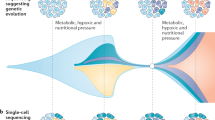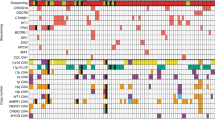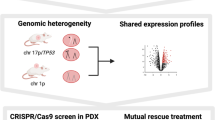Abstract
Understanding the basis of chemoresistance is a principal goal of molecular oncology. We have exploited a murine lymphoma model and retroviral gene transfer to rapidly generate a series of spontaneous tumors differing only in a gene of interest, and subsequently studied the impact of the test gene on the treatment sensitivity of tumors at their natural site. We demonstrate that the Bcl-2 oncoprotein produces multi-drug resistance when assessed in primary lymphomas in vivo. In contrast, this effect was dramatically reduced when the primary lymphomas were subjected to long-term culture, and completely missed in the standard clonogenic survival assay. This model highlights the importance of physiological test systems to address the complexity of clinical drug resistance and provides a novel strategy to evaluate compounds targeting specific genetic lesions.
This is a preview of subscription content, access via your institution
Access options
Subscribe to this journal
Receive 12 print issues and online access
$209.00 per year
only $17.42 per issue
Buy this article
- Purchase on Springer Link
- Instant access to full article PDF
Prices may be subject to local taxes which are calculated during checkout





Similar content being viewed by others
References
Brown, J.M. & Wouters, B.G. Apoptosis, p53, and tumor cell sensitivity to anticancer agents. Cancer Res. 59, 1391–1399 (1999).
Schmitt, C.A., McCurrach, M.E., de Stanchina, E., Wallace-Brodeur, R.R. & Lowe, S.W. INK4a/ARF mutations accelerate lymphomagenesis and promote chemoresistance by disabling p53. Genes Dev. 13, 2670–2677 (1999).
Bearss, D.J. et al. Genetic determinants of response to chemotherapy in transgenic mouse mammary and salivary tumors. Oncogene 19, 1114–1122 (2000).
Omer, C.A. et al. Mouse mammary tumor virus-ki-rasB transgenic mice develop mammary carcinomas that can be growth-inhibited by a farnesyl:protein transferase inhibitor. Cancer Res. 60, 2680–2688 (2000).
Adams, J.M. et al. The c-myc oncogene driven by immunoglobulin enhancers induces lymphoid malignancy in transgenic mice. Nature 318, 533–538 (1985).
Harris, A.W. et al. The Eμ-myc transgenic mouse. A model for high-incidence spontaneous lymphoma and leukemia of early B cells. J. Exp. Med. 167, 353–371 (1988).
El-Rouby, S. et al. p53 gene mutation in B-cell chronic lymphocytic leukemia is associated with drug resistance and is independent of MDR1/MDR3 gene expression. Blood 82, 3452–3459 (1993).
Wattel, E. et al. p53 mutations are associated with resistance to chemotherapy and short survival in hematologic malignancies. Blood 84, 3148–3157 (1994).
Ichikawa, A. et al. Mutations of the p53 gene as a prognostic factor in aggressive B-cell lymphoma. N. Engl. J. Med. 337, 529–534 (1997).
Wilson, W.H. et al. Relationship of p53, bcl-2, and tumor proliferation to clinical drug resistance in non-Hodgkin's lymphomas. Blood 89, 601–609 (1997).
Navaratnam, S. et al. Expression of p53 predicts treatment failure in aggressive non-Hodgkin's lymphomas. Leuk. Lymphoma 29, 139–144 (1998).
Moller, M.B., Gerdes, A.M., Skjodt, K., Mortensen, L.S. & Pedersen, N.T. Disrupted p53 function as predictor of treatment failure and poor prognosis in B- and T-cell non-Hodgkin's lymphoma. Clin. Cancer Res. 5, 1085–1091 (1999).
Prince, V.E. & Rigby, P.W. Derivatives of moloney murine sarcoma virus capable of being transcribed in embryonal carcinoma stem cells have gained a functional Sp1 binding site. J. Virol. 65, 1803–1811 (1991).
Yin, D.X. & Schimke, R.T. Bcl-2 expression delays drug-induced apoptosis but does not increase clonogenic survival after drug treatment in HeLa cells. Cancer Res. 55, 4922–4928 (1995).
Lock, R.B. & Stribinskiene, L. Dual modes of death induced by etoposide in human epithelial tumor cells allow Bcl-2 to inhibit apoptosis without affecting clonogenic survival. Cancer Res. 56, 4006–4012 (1996).
Kyprianou, N., King, E.D., Bradbury, D. & Rhee, J.G. Bcl-2 overexpression delays radiation-induced apoptosis without affecting the clonogenic survival of human prostate cancer cells. Int. J. Cancer 70, 341–348 (1997).
Hermine, O. et al. Prognostic significance of bcl-2 protein expression in aggressive non-Hodgkin's lymphoma. Groupe d'Etude des Lymphomes de l'Adulte (GELA). Blood 87, 265–272 (1996).
Reed, J.C. Mechanisms of Bcl-2 family protein function and dysfunction in health and disease. Behring Inst. Mitt. 97, 72–100 (1996).
Gascoyne, R.D. et al. Prognostic significance of Bcl-2 protein expression and bcl-2 gene rearrangement in diffuse aggressive non-Hodgkin's lymphoma. Blood 90, 244–251 (1987).
Reed, J.C. Bcl-2 family proteins: regulators of apoptosis and chemoresistance in hematologic malignancies. Semin. Hematol. 34 (Suppl. 5), 9–19 (1997).
Uckun, F.M. et al. Cellular expression of antiapoptotic Bcl-2 oncoprotein in newly diagnosed childhood acute lymphoblastic leukemia: a Children's Cancer Group study. Blood 89, 3769–3777 (1997).
Liu R., Page, C., Beidler, D.R., Wicha, M.S. & Nunez, G. Overexpression of Bcl-x(L) promotes chemotherapy resistance of mammary tumors in a syngeneic mouse model. Am. J. Pathol. 155, 1861–1867 (1999).
Walker, A., Taylor, S.T., Hickman, J.A. & Dive, C. Germinal center-derived signals act with Bcl-2 to decrease apoptosis and increase clonogenicity of drug-treated human B lymphoma cells. Cancer Res. 57, 1939–1945 (1997).
Taylor, S.T., Hickman, J.A. & Dive, C. Epigenetic determinants of resistance to etoposide. Regulation of Bcl-xL and Bax by tumor microenvironmental factors. J. Natl. Cancer Inst. 92, 18–23 (2000).
Namen, A.E. et al. Stimulation of B-cell progenitors by cloned murine interleukin-7. Nature 333, 571–573 (1988).
Hsu, B. et al. Evidence that c-myc mediated apoptosis does not require wild-type p53 during lymphomagenesis. Oncogene 11, 175–179 (1995).
Strasser, A., Harris, A.W., Bath, M.L. & Cory, S. Novel primitive lymphoid tumours induced in transgenic mice by cooperation between myc and bcl-2. Nature 348, 331–333 (1990).
Bissonnette, R.P., Echeverri, F., Mahboubi, A. & Green, D.R. Apoptotic cell death induced by c-myc is inhibited by bcl-2. Nature 359, 552–554 (1992).
Fanidi, A., Harrington, E.A. & Evan, G.I. Cooperative interaction between c-myc and bcl-2 proto-oncogenes. Nature 359, 554–556 (1992).
Schmitt, C.A. & Lowe, S.W. Apoptosis and therapy. J. Pathol. 187, 127–137 (1999).
Di Leonardo, A., Linke, S.P., Clarkin, K. & Wahl, G.M. DNA damage triggers a prolonged p53-dependent G1 arrest and long-term induction of Cip1 in normal human fibroblasts. Genes Dev. 8, 2540–2551 (1994).
Waldman, T. et al. Cell-cycle arrest versus death in cancer therapy. Nature Med. 3, 1034–1036 (1997).
Chang, B.D.,. et al. A senescence-like phenotype distinguishes tumor cells that undergo terminal proliferation arrest after exposure to anticancer agents. Cancer Res. 59, 3761–3767 (1999).
Pomp, J. et al. Cell density dependent plating efficiency affects outcome and interpretation of colony forming assays. Radiother. Oncol. 40, 121–125 (1996).
Serrano, M., Lin, A.E., McCurrach, M.E., Beach, D. & Lowe, S.W. Oncogenic ras provokes premature cell senescence associated with accumulation of p53 and p16INK4a. Cell 88, 593–602 (1997).
Acknowledgements
We thank A.W. Harris for the Eμ-myc transgenic mice, C.J. Sherr for the T220-29 cells, W.S. Pear for the MSCV-IRES-GFP construct, K. Sokol and C. Cordon-Cardo for histopathology, S. Lee, M.E. McCurrach, J. Fridman, G. Ferbeyre and M. Narita for helpful comments, and L. Bianco and the CSHL Animal Facility for technical assistance. Supported by grants from the American Cancer Society (RPG-99-200-01-LBC) and the Laurie Strauss Leukemia Foundation (S.W.L.). C.A.S. is a Dr. Mildred Scheel Cancer Foundation fellow and S.W.L. is a Rita Allen Foundation Scholar.
Author information
Authors and Affiliations
Corresponding author
Rights and permissions
About this article
Cite this article
Schmitt, C., Rosenthal, C. & Lowe, S. Genetic analysis of chemoresistance in primary murine lymphomas. Nat Med 6, 1029–1035 (2000). https://doi.org/10.1038/79542
Received:
Accepted:
Issue Date:
DOI: https://doi.org/10.1038/79542
This article is cited by
-
Monitoring autochthonous lung tumors induced by somatic CRISPR gene editing in mice using a secreted luciferase
Molecular Cancer (2022)
-
Virus-induced senescence is a driver and therapeutic target in COVID-19
Nature (2021)
-
H3K9me3-mediated epigenetic regulation of senescence in mice predicts outcome of lymphoma patients
Nature Communications (2020)
-
Oxo-aglaiastatin-Mediated Inhibition of Translation Initiation
Scientific Reports (2019)
-
Senescence-associated reprogramming promotes cancer stemness
Nature (2018)



